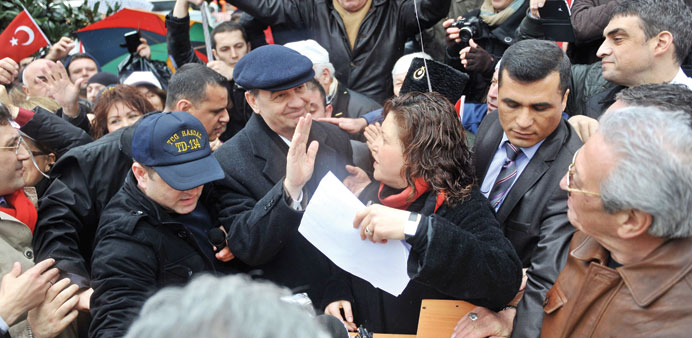AFP/Istanbul
Turkey’s former army chief Ilker Basbug, who was jailed for life last year for plotting to overthrow the Islamic-rooted government, walked free from prison late on Friday after a court ordered his release.
“We were put behind bars by those who act on revenge and hatred,” Basbug said in an emotional speech following his release from the high-security Silivri prison near Istanbul, where he was held for more than two years.
“Prison means pain, agony and suffering,” he said. “But I do not harbour any revenge or hatred because love conquers hatred.”
The release came a day after Turkey’s Constitutional Court ruled that Basbug’s legal rights had been violated, saying that a lower court had failed to publish its detailed verdict on the case and send it to the appeals court.
The court has imposed an overseas travel ban on the ex-commander, according to local media.
Basbug was initially detained in 2012 before being sentenced to life in prison in August 2013, along with hundreds of other military officers who were given long jail terms for their roles in the so-called “Ergenekon” conspiracy to overthrow the government.
But Basbug said he would continue his legal struggle until his last comrade in jail is set free.
“My release is just the beginning,” he said. “I firmly believe that all of my comrades will be released soon. If that does not happen, there is no point in my being released. Our hands are clean. We have only one demand: justice.”
The 71-year-old general, who led the army between 2008 and 2010, again denied the charges.
“Turkish people have understood that we have no interest in plotting a coup, that it is unacceptable to accuse a general of being a member of a terrorist organisation,” he said.
The military, which sees itself as the guarantor of Turkey’s secular constitution, has carried out three coups – in 1960, 1971 and 1980 – and pressured an Islamist government to step down in 1997.
Prime Minister Recep Tayyip Erdogan has spent the best part of his 11 years in power trying to curb the military’s influence.
But he has recently sought to bring the army to his side as he fights for political survival in a bitter feud with his ally-turned-opponent Fethullah Gulen, a Muslim cleric whom he accuses of instigating a corruption scandal to topple him.
In a conciliatory gesture toward the army that increases the chances of retrials for the hundreds of convicted officers, parliament in February abolished the specially-appointed courts that tried them.
The Constitutional Court’s ruling could set a precedent for more than 200 others jailed for their alleged roles in coup conspiracies.
“I hope the decision will set a precedent and other victims – some suffering from grave health problems – will be released immediately,” Basbug’s lawyer Ilkay Sezer said earlier on Friday.
The mass coup trial, seen as a key test in Erdogan’s showdown with secularist and military opponents, polarised the country, with critics denouncing it as a witch hunt to stifle dissenting voices.
The government now appears keen to blame Gulen for the trials against the military.
An adviser to the prime minister recently suggested that Gulen supporters masterminded the trials.
The influential Gulen movement was a key backer of Erdogan’s Justice and Development Party (AKP) when it first came to power in 2002.
But the alliance shattered after police raids in December, in which dozens of Erdogan’s key business and political allies were detained on corruption allegations.
The Turkish premier has accused followers of Gulen in the police and the judiciary of concocting the investigation to unseat his government in a crucial election year.
Gulen has lived in the eastern US state of Pennsylvania since he left Turkey in 1999 to escape prosecution on charges of “anti-secular activities”.
Basbug was a staunch defender of the military in its showdown with the government, calling the trials a “black stain” on the country’s history.
He has not fully refuted the idea that a conspiracy existed.
“If Turkey wants to become a state of law, it has to answer who has planned and put in practice the project of creating a virtual Ergenekon terror organisation,” he said on Friday.
A former Nato-trained career soldier seen as a political moderate, he once led Turkey’s military campaign against outlawed Kurdish rebels but later took a conciliatory approach to resolving the three-decade conflict.
Professor Ahmet Insel, author of two books on the Turkish armed forces, said he does not count Basbug among the hardline generals who in 1997 helped bring down the government of the Islamist premier Necmettin Erbakan, Erdogan’s mentor.
“He is a general who tries to keep the Turkish army in the barracks,” Insel said.

Basbug (centre) arriving yesterday at Besiktas in Istanbul to attend a ‘Silence Scream’ protest, organised by relatives of jailed army members accused
